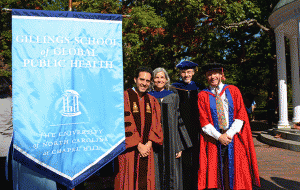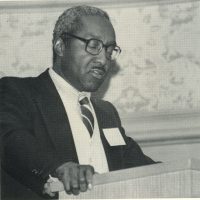Eng, Stafford, Cole and Darity honored at University Day event
October 12, 2016
The Gillings School of Global Public Health received special recognition during the ceremonies of yesterday’s University Day, which marked the 223rd anniversary of the University of North Carolina’s founding. Two people affiliated with the Gillings School, Eugenia Eng and Paula Brown Stafford, were celebrated in person, and the historic legacy of two others, Genevieve Lowery Cole and William Alexander Darity Sr., were acknowledged as pioneering “firsts.”
Eugenia Eng, DrPH, alumna and professor of health behavior at the Gillings School, accepted the Edward Kidder Graham Faculty Service Award, which recognizes a faculty member’s outstanding service to the University, state and nation.
Paula Brown Stafford, MPH, former president of clinical development at Quintiles who received undergraduate and master’s degrees in biostatistics at the Gillings School, was named one of five University Distinguished Alumni.
Graham Faculty Service Award
Dr. Geni Eng, a trailblazer in community-engaged scholarship, refined the innovative lay health adviser intervention model, an approach that builds on the social support function of social networks that exist naturally within communities.
The model is an “assets-based” approach to community-based research that encourages partnerships among professionally trained health educators, academics and lay community residents.
Eng first tested the model with African-American churches in North Carolina. Through her research and practice, she has left in place dozens of active, robust lay health adviser networks in communities throughout North Carolina.
She also pioneered action-oriented community diagnosis, a unique and effective tool for community assessment, planning and mobilization. She has worked with dozens of North Carolina communities to conduct community diagnoses and trained hundreds of students over several decades. The impact of this body of work can be seen in stronger North Carolina communities.
Recognized nationally as an innovator in the area of community-based participatory research (CBPR), a practice that meets the highest ethical standard for research done in communities, Eng has fostered collaborative and participatory partnerships among academics, community-based organizations and health practitioners across North Carolina and in African and Southeast Asian countries.
After completing an undergraduate degree at The University of Wisconsin at Madison, Eng served two years in the Peace Corps. She subsequently earned Master of Public Health and Doctor of Public Health degrees at UNC-Chapel Hill and joined the faculty of UNC’s public health school in 1984.
She is the winner of numerous UNC and national awards, including the Robert Allen Symbol of HOPE Award from the American Journal of Health Promotion (1999); the Thomas A. Bruce Award of Honor from the American Public Health Association’s Community-Based Public Health Caucus (2008); and the Distinguished Fellow Award from the Society for Public Health Educators (2010). From UNC, she received the Greenberg Award for Excellence in Research, Teaching and Service (2001), the UNC Provost’s Award for Engaged Scholarship (2006) and the Gillings Teaching Innovations Award (2016). In 2014, she was inducted as an inaugural member of the Academy of Community Engagement Scholarship.
University Distinguished Alumna
Paula Brown Stafford had a successful 30-year career with Quintiles, the world’s largest provider of biopharmaceutical development and commercial outsourcing services, a Fortune 500 company and one of Fortune magazine’s “World’s Most Admired Companies.”
During those decades, she was involved directly in the successful development and regulatory approval of hundreds of life-changing drug therapies for patients both in North Carolina and throughout the entire world.
Joining Quintiles in 1985, Stafford was the 23rd employee at the fledgling company, which today boasts more than 36,000 employees conducting business in 100 countries. As president of clinical development, her part of Quintiles’ business generated nearly three-quarters of the company’s $4.3 billion in net revenue for 2015.
A recognized leader in the field of biopharmaceutical development, she was invited to provide expert testimony before a Congressional hearing in 2014 on the topic of modernizing clinical trials. There, she provided recommendations and possible approaches in three key areas of drug development—patients, pathways and processes—to accelerate the delivery of therapies to patients. A statement from her testimony summarizes the focus of her work: “Modernizing clinical trials is critical if we are to meet the goals we share of delivering medicines faster, at less cost, to patients who need them.”
Stafford’s impact in the ever-changing field of health care and pharmaceutical development became personal upon the completion of her first beginning-to-end clinical trial. In that trial, she oversaw the development of a diabetes drug that has allowed her own grandmother to live well into her 90s by managing the chronic disease that affects roughly 30 million adults in the United States alone.
Since retiring from Quintiles in 2015, Stafford provides leadership consulting services to various organizations and serves as an adjunct professor at the Gillings School, where she previously served as president of the Public Health Foundation board of directors. She also serves on the board of directors for Health Decisions, a full-service contract research organization based in Durham, N.C.
Scholarships were also named for Cole and Darity. The official citations read aloud at the ceremony recognized them both as pioneers who represented historic “firsts” at UNC. Specifically:
Genevieve Lowery Cole, MPH, a member of the Lumbee tribe, Cole was the first female American Indian student to graduate from Carolina. After earning a degree in medical technology she worked in clinical labs at the University of California Medical Center and later returning to Carolina for her master’s degree in public health. She went on to a successful career as a microbiologist working at both Duke and N.C. State universities.
William Alexander Darity Sr., PhD, in 1964 became the first black student to earn a doctorate from Carolina in what is now the Gillings School of Global Public Health. He was founding dean of the School of Health Sciences at the University of Massachusetts Amherst and an emeritus professor. Darity served Carolina as a member of the Board of Trustees from 1985 to 1991 during a period that included board debate about race and inclusion issues.
About University Day

Members of the environmental sciences and engineering faculty (l-r) Drs. Will Vizuete, Barbara Turpin, Mike Aitken and Jamie Bartram prepare to join the University Day procession in 2015.
University Day is an occasion to remember the University’s past and celebrate its future. The date, Oct. 12, marks the laying in 1793 of the cornerstone of Old East, the institution’s first building and the oldest state university building in the U.S. The UNC community first celebrated University Day in 1877, after Governor Zebulon B. Vance, as chair of the board of trustees, ordered that the day “be observed with appropriate ceremonies under the direction of the faculty.”
Since 1971, the faculty has presented the Distinguished Alumna and Alumnus Awards on University Day to recognize those who have made outstanding contributions to humanity.
The Edward Kidder Graham Award, established in 2010 to recognize outstanding service by a member of the faculty, calls to remembrance UNC President Graham’s ambition to “to make the campus co‐extensive with the boundaries of the State,” in the context of the University’s modern mission to extend knowledge‐based service worldwide.
For 223 years, Carolina has symbolized the importance of education in a democratic nation. It remains a place defined by those values, as noted by Governor Terry Sanford in 1987, of “freedom and liberty and tolerance, the search for truth, the defense of dignity, courage to arrive freely at convictions, and the personal courage to stand for those hopes and truths.”
This year, the University Day celebration was held on Oct. 11, in observance of Yom Kippur on Oct. 12.
Share
Gillings School of Global Public Health contact: David Pesci, director of communications, (919) 962-2600 or dpesci@unc.edu




